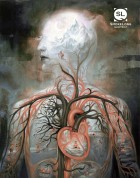What are the risks and rewards of using dark humor about difficult or painful circumstances to drive a story?
I don’t think much of the risks. I think a reader must be thrown right in there where they want to cry, but then find out they’ve been tricked into some humor, or the other way around. Those juxtaposed feelings are the great reward.
In a very short span of life on the page, Sweetie transforms from a quirky love interest to a sex idol to goddess who represents safety and connection to humanity. Was her growth over the story intentional or organic? How do you flesh out your secondary characters?
I didn’t think too much about it, so I guess you could call it organic. Once she starts reading about existentialism, she’s evolved into a new person.
The sentences in “Sweetness” are very clear, clean, and rhythmic, smoothly balancing style, aesthetic, and narrative movement. What’s your revision process like? How do you develop sentences that move so well?
I keep cutting sentences until there’s a rhythm when you read them out loud. That’s my key, reading out loud. Plus, it’s damn fun to write like that.
Share a line (or two or three) from a writer you admire and describe how these lines exemplify the writer’s influence on your work and on literature at large.
“Only that which does not explain or instruct is irresistible.”—Maeve Brennan.
What are your current projects? What’s next in your artistic life?
I’m currently working on a book of flash fictions.


